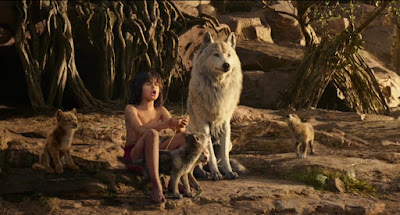or
I Don't Know, Silly Boy, I've Never Kipled!
Amusingly, Disney's latest version of the The Jungle Book* starts in media res—or more properly, "in media race"—the usual Disney Pictures logo of Cinderella's castle moving away to disappear into a jungle landscape, as if you had just taken a tram into "Adventureland", and into a frantic running track-shot following a child in red Zardoz pants as he scampers (not unlike their animated Tarzan, which will get its own Disney live action variant soon, I'm sure) across jungle floor and twisted tree-limbs in a parkour-like chase with three wolves. They are, of course, his adopted siblings, and this is Mowgli our hero (Neel Sethi, who's a natural, a really good "kid" performance), abandoned in near infancy to be mentored by the panther Bagheera (Ben Kingsley voicing not like Ben Kingsley) and raised by Akela (Giancarlo Esposito) and Neela (Lupita Nyong'o, another sterling performance just by voice), wolves in the jungles of India. The "man-cub," as he is called (for good or ill) just cannot keep pace with his four-legged brethren, but is still encouraged to keep trying—he's still learning.
Shere Khan makes bad on his threat—even the wolves are willing to throw Mowgli to the...tiger. But, his family won't give him up, and Mowgli reluctantly elects to leave the jungle to seek the nearby man-village for safety. Bagheera volunteers to escort Mowgli and watch over him for his safety.
Pretty familiar stuff, for those who know their Kipling and their Disney-Kipling. The thing is animated like nothing else with armies of special effects wizards (and some input from Pixar, Disney's partner, which perfected its nature designs with the middling The Good Dinosaur). The animals are amazing, lithe, extraordinarily expressive, with really good, sometimes unusual, choices for voice actors.
Like Bill Murray's Baloo. The 1967 animated version of The Jungle Book is a favorite among the current crop of animators and film-makers. Its combination of full-bloom Disney animation—after cutting corners on some of their '60's cartoons like 101 Dalmations, Disney went full-boar on Jungle Book—and the culture clash between Indian story-telling (with an empirical, if sympathetic, edge) with New Orleans jazz, and with voices like Phil Harris, George Sanders, and (especially) bandleader Louis Prima, showed Disney was willing to infuse more animated voice-personality with their animation. Murray isn't as loquacious as Harris—this Baloo is a bit melancholy by comparison—but there is something about his performance that has a tinge of Harris' charm to it. Scarlett Johansson's Kaa is short, not sweet, and a bit under-utilized—the character is there to relate back-story, not much else.
Where the movie receives a genuine kick in the loin-cloth is when Mowgli is kidnapped (as in the animated version) by the monkey-followers of King Louis, who has other plans for the man-cub. It's here where director Jon Favreau's heart seems to be. Louis Prima was one hep cat (of the human variety), and his King Louis was a highlight of the '67 version. Favreau changes the species of ape from orangutan to the extinct gigantopithecus and delves into his film-student roots by portraying Louis as like Col. Kurtz in Apocalypse Now—he's kept in shadow with only portions of his head showing, his paws caressing his head like Marlon Brando's bald dome in Coppola's Viet Nam fantasia. And he picks Christopher Walken as the voice of Louis, which in the slow apocalyptian reveal is a little creepy, especially when the huge ape is being vague and elliptical—one gets the feeling that Louis is going to talk about gardens where it seemed like Heaven came down in the form of gardenias. ("I saw...a snail....")
 |
| "Mowgli...why do you treat me so disrespectfully..." |
But, that Walken segment does rather point to what the movie could have been—a lot more fun. Oh, sure, it's fascinating to watch. The details and the animation are amazing, almost miraculous in what they achieved, but the filmmakers play it safe by keeping a more reverential tone about the proceedings, lest it betray some token realism achieved by the visuals. The Good Dinosaur did the same thing—beautiful to look at, but the movie was not good, Pixar's worst since they garaged the "Cars" movies. It's dark in the jungle, sure, but does it have to be this dark?
And then, they have to spoil everything by going to the fallback "superhero-revenge" mode that seems to shellac and shackle most movies these days. It is not enough that Mowgli defeat Shere Khan out of self-interest and self-defense. No, there has to be a revenge element to it, too, which seems completely unnecessary, even if screenwriter Justin Marks deems it so. I was half-way expecting Mowgli to yell "Noooooo" to the Heavens (he DOES use the "Star Wars" equivalent for blame-charging to your mentor "Why didn't you TELL me?") and finish off the movie with a triumphant "See you in HELL, Shere Khan!"** At Disney, one daren't tread too far from The Lion King's throne. Pity. There is artistry throughout The Jungle Book pictorially, but serving a hesitant concept (surprising because it worked so well in 1967). One wishes they didn't take it quite so seriously in the story. Then, it could have been something truly magical in the Disney tradition.
* There was, of course, the animated version—the last film with Uncle Walt's input from 1967 (which this film is based on), and there's a another live-action version (sans songs) produced in 1994, starring Jason Scott Lee, Cary Elwes, Sam Neill and John Cleese.
** What, they couldn't have put in a "Khaaaaaan!" just for cross-reference satisfaction? Favreau betrays his Team "Star Wars" preference.









No comments:
Post a Comment